前景英语unit 5 讲稿
- 格式:doc
- 大小:77.00 KB
- 文档页数:10
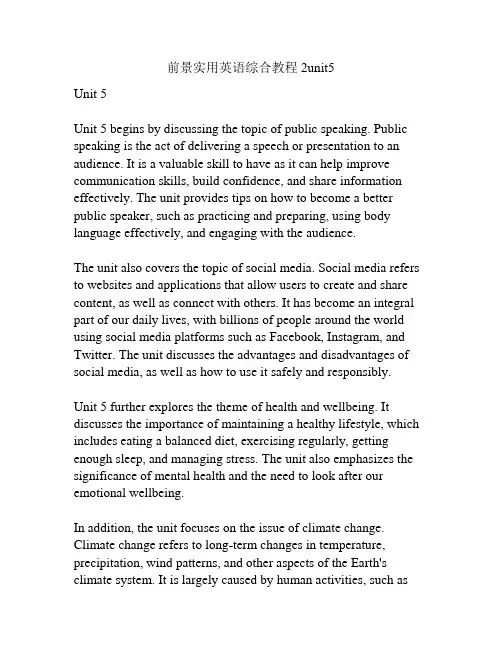
前景实用英语综合教程2unit5Unit 5Unit 5 begins by discussing the topic of public speaking. Public speaking is the act of delivering a speech or presentation to an audience. It is a valuable skill to have as it can help improve communication skills, build confidence, and share information effectively. The unit provides tips on how to become a better public speaker, such as practicing and preparing, using body language effectively, and engaging with the audience.The unit also covers the topic of social media. Social media refers to websites and applications that allow users to create and share content, as well as connect with others. It has become an integral part of our daily lives, with billions of people around the world using social media platforms such as Facebook, Instagram, and Twitter. The unit discusses the advantages and disadvantages of social media, as well as how to use it safely and responsibly.Unit 5 further explores the theme of health and wellbeing. It discusses the importance of maintaining a healthy lifestyle, which includes eating a balanced diet, exercising regularly, getting enough sleep, and managing stress. The unit also emphasizes the significance of mental health and the need to look after our emotional wellbeing.In addition, the unit focuses on the issue of climate change. Climate change refers to long-term changes in temperature, precipitation, wind patterns, and other aspects of the Earth's climate system. It is largely caused by human activities, such asburning fossil fuels and deforestation. The unit discusses the effects of climate change, such as rising sea levels, extreme weather events, and the loss of biodiversity. It also provides suggestions on how individuals can contribute to reducing their carbon footprint and mitigating the impacts of climate change.Finally, the unit explores the theme of creativity and innovation. It discusses the importance of creativity in various aspects of life, such as problem-solving, entrepreneurship, and arts and culture. The unit encourages students to think outside the box, generate new ideas, and embrace innovation. It also highlights the role of technology in driving creativity and fostering innovation.Overall, Unit 5 covers a wide range of topics that are relevant and useful in today's world. It provides practical tips and information that can help students improve their public speaking skills, navigate social media safely, maintain a healthy lifestyle, understand climate change, and foster creativity and innovation.。
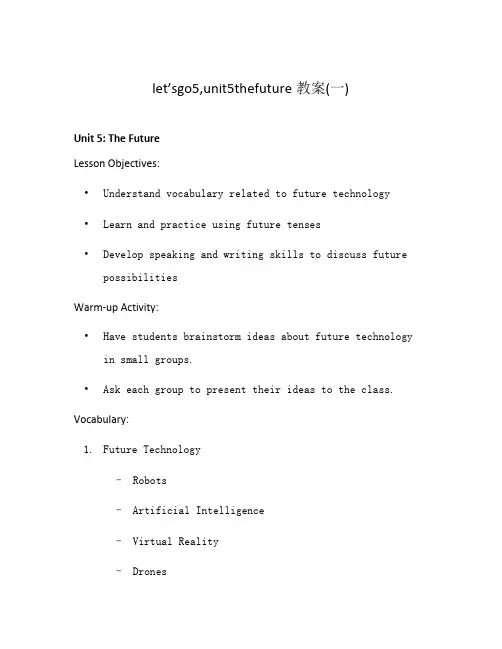
let’sgo5,unit5thefuture教案(一)Unit 5: The FutureLesson Objectives:•Understand vocabulary related to future technology •Learn and practice using future tenses•Develop speaking and writing skills to discuss future possibilitiesWarm-up Activity:•Have students brainstorm ideas about future technology in small groups.•Ask each group to present their ideas to the class. Vocabulary:1.Future Technology–Robots–Artificial Intelligence–Virtual Reality–Drones2.Verbs related to technology–Develop–Innovate–Communicate–ExplorePresentation:1.Introduce and explain each vocabulary term using simpledefinitions and examples.–Robots: Machines designed to perform tasksautonomously or with minimal human intervention.–Artificial Intelligence: The ability of machines to simulate human intelligence and make decisions.–Virtual Reality: An artificial environment created with computer technology that simulates animmersive experience.–Drones: Unmanned aerial vehicles used for various purposes, such as aerial photography or delivery.2.Show pictures or videos related to each term and elicitresponses from students.3.Have students practice pronouncing and memorizing thevocabulary terms.Grammar Focus:•Introduce different future tenses:–Future Simple: “will + base verb”–Future Continuous: “will be + -ing form verb”–Future Perfect: “will have + past participle verb”•Explain the usage of each future tense and provide examples.•Give students practice exercises to reinforce the understanding and usage of future tenses.Speaking Activity:•Divide students into pairs.•Provide a list of discussion questions related to future technology.•Each pair should take turns asking and answering the questions, using future tenses.•Monitor the conversations and provide feedback on grammar and fluency.Writing Activity:•Ask students to write a short paragraph predicting the future of technology.•Encourage them to use the vocabulary and future tenses learned in this lesson.•Provide sentence starters or prompts to guide their writing.•Collect and review the students’ paragraphs for assessment and feedback.Wrap-up Activity:•Ask students to share interesting ideas or predictions they wrote in their paragraphs.•Have a class discussion regarding the advantages and disadvantages of future technology.•Summarize the main points discussed and encourage students to think about the impact of technology intheir lives.Homework:•Assign a writing task for homework, where students have to imagine and describe a day in their life using future technology.•Remind students to use appropriate vocabulary and future tenses in their writing.Note: You can modify and adapt this lesson plan according to the specific needs and language level of your students. Extension Activities:Listening Activity:•Provide a listening task where students listen to a conversation or a news report about a new technologicaladvancement.•Ask comprehension questions to check their understanding of the content.•Encourage students to take notes while listening and summarize what they heard.Reading Activity:•Assign a reading passage or an article related to future technology.•Have students read the text individually or in pairs. •Ask comprehension questions to assess theirunderstanding of the text.•Discuss the main ideas and opinions presented in the reading.Role-Play Activity:•Divide students into groups and assign them different roles, such as a technology developer, a journalist, ora consumer.•Provide a scenario or a problem related to future technology.•Each group should prepare a role-play dialogue where they discuss and try to find a solution to the givenscenario.•Encourage students to use vocabulary and future tenses in their dialogue.Project:•Assign a project where students have to research and present a futuristic invention or technology.•Students can create a poster, a presentation, or a multimedia project showcasing their chosen technology. •They should include information about the technology, its potential uses, benefits, and drawbacks.•Allow time for students to present their projects to the class.Remember to provide feedback and guidance throughout the lesson to ensure students’ understanding and progress.。
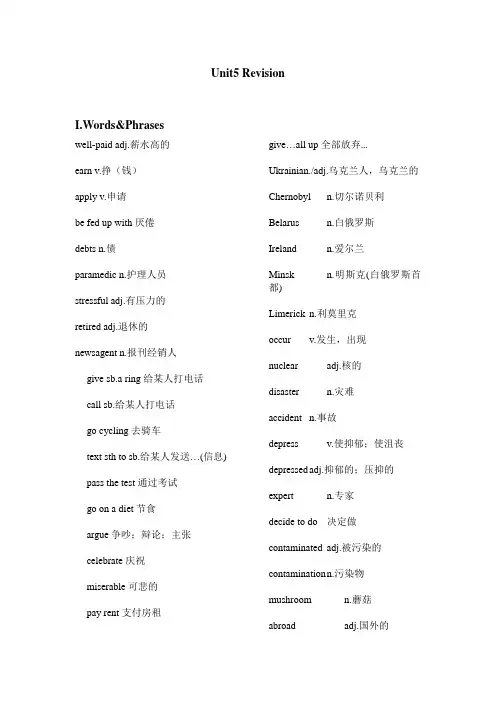
Unit5 Revision I.Words&Phraseswell-paid adj.薪水高的earn v.挣(钱)apply v.申请be fed up with厌倦debts n.债paramedic n.护理人员stressful adj.有压力的retired adj.退休的newsagent n.报刊经销人give sb.a ring给某人打电话call sb.给某人打电话go cycling去骑车text sth to sb.给某人发送…(信息) pass the test通过考试go on a diet节食argue争吵;辩论;主张celebrate庆祝miserable可悲的pay rent支付房租give…all up全部放弃…Ukrainian./adj.乌克兰人,乌克兰的Chernobyl n.切尔诺贝利Belarus n.白俄罗斯Ireland n.爱尔兰Minsk n.明斯克(白俄罗斯首都)Limerick n.利莫里克occur v.发生,出现nuclear adj.核的disaster n.灾难accident n.事故depress v.使抑郁;使沮丧depressed adj.抑郁的;压抑的expert n.专家decide to do 决定做contaminated adj.被污染的contamination n.污染物mushroom n.蘑菇abroad adj.国外的nervous adj.紧张的immediately adv.立刻地communicate v.沟通;传达communication n.交流;通信a phrase book 常用语手册offer to do 主动做delight n./v.高兴;使高兴delighted adj.高兴的,愉快的teen adj.十几岁的run n.跑步;经营biochemistry n.生物化学full-time 全天候的move back搬回去,后退grow up长大give up放弃pick up foreign languages习得语言take off起飞,脱下(衣,帽,眼镜等)put on穿上(衣服),戴上(帽子眼镜等)get sth.out拿出,取出lie down躺下look at看pay(sb.)back还(某人)钱throw sth.Away扔掉某物try sth.on试穿look for sth.寻找某物turn sth.off关掉turn round转身pick sth.up捡起某物drop litter扔垃圾on the floor在地板上freezer冰箱look up a word查单词look after a baby照看宝宝run out of milk喝完(光)牛奶fall out with sb.与某人争吵(闹别扭)get on well with sb.和某人相处友好miserable悲惨的,令人痛苦的be good at doing sth.擅长做某事earn a fortune获得财富the population of China中国的人口II.Grammar1.Verb+to+infinitivechoose/decide/forget/promise/manage/need/help/hope/try/want/would like/would loveThey want to buy a new car.I’d like to go abroad.2.Verb+-inglike/love/enjoy/hate/finish/stopWe love going to parties.I enjoy travelling abroad.3.Verb+-ing or+to+infinitive with no change in meaningbegin/start/continueIt started to rain/raining.I continued to work/working in the library.4.Verb+preposition+-ingWe’re thinking of moving house.I’m looking forward to having more free time.5.Like doing and would like to do1.like doing and love doing express a general enjoyment.I like working as a teacher.=I’m a teacher and I enjoy it.I love dancing.=This is one of my hobbies.6.Would like to do and would love to do express a preference now or at a specific time.I’d like to be a teacher.=When I grow up,I want to be a teacher.Thanks.I’d love to dance.=At a party,I am pleased you ask me.QuestionWould you like to dance?Yes,I would./Yes,I’d love to.Would you like to come for a walk?Yes,I would./No,thank you.No,I wouldn’t is not common because it is impolite.7.something/anything+adj.Eg.Are you doing anything interesting this weekend?8.Wow,that sounds fantastic.(哇,这听起来太棒了。

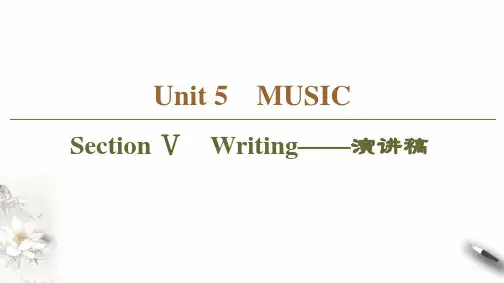
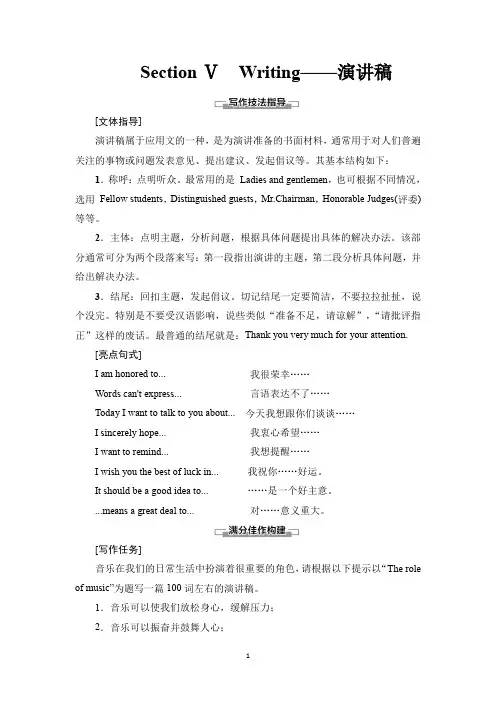
Section ⅤWriting——演讲稿[文体指导]演讲稿属于应用文的一种,是为演讲准备的书面材料,通常用于对人们普遍关注的事物或问题发表意见、提出建议、发起倡议等。
其基本结构如下:1.称呼:点明听众。
最常用的是Ladies and gentlemen,也可根据不同情况,选用Fellow students,Distinguished guests,Mr.Chairman,Honorable Judges(评委)等等。
2.主体:点明主题,分析问题,根据具体问题提出具体的解决办法。
该部分通常可分为两个段落来写:第一段指出演讲的主题,第二段分析具体问题,并给出解决办法。
3.结尾:回扣主题,发起倡议。
切记结尾一定要简洁,不要拉拉扯扯,说个没完。
特别是不要受汉语影响,说些类似“准备不足,请谅解”,“请批评指正”这样的废话。
最普通的结尾就是:Thank you very much for your attention.[亮点句式]I am honored to...我很荣幸……Words can't express... 言语表达不了……Today I want to talk to you about... 今天我想跟你们谈谈……I sincerely hope... 我衷心希望……I want to remind... 我想提醒……I wish you the best of luck in... 我祝你……好运。
It should be a good idea to... ……是一个好主意。
...means a great deal to... 对……意义重大。
[写作任务]音乐在我们的日常生活中扮演着很重要的角色,请根据以下提示以“The role of music”为题写一篇100词左右的演讲稿。
1.音乐可以使我们放松身心,缓解压力;2.音乐可以振奋并鼓舞人心;3.音乐能够抚慰我们的心灵,帮助我们走出困境;4.音乐可以帮我们更好地了解别的文化。
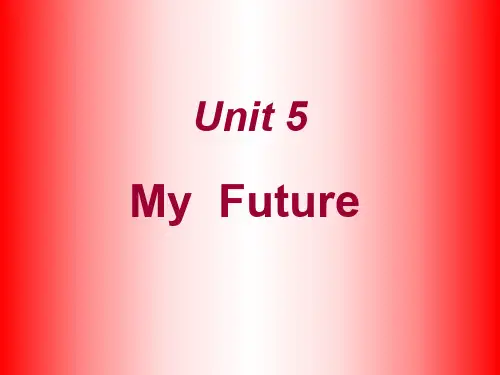

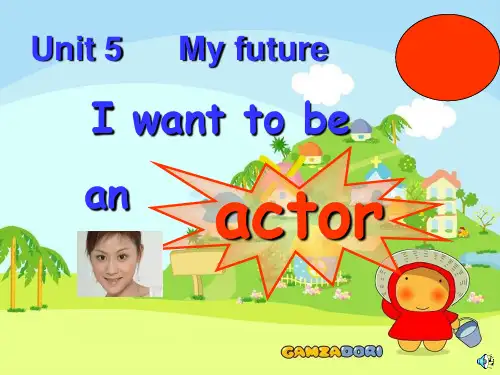
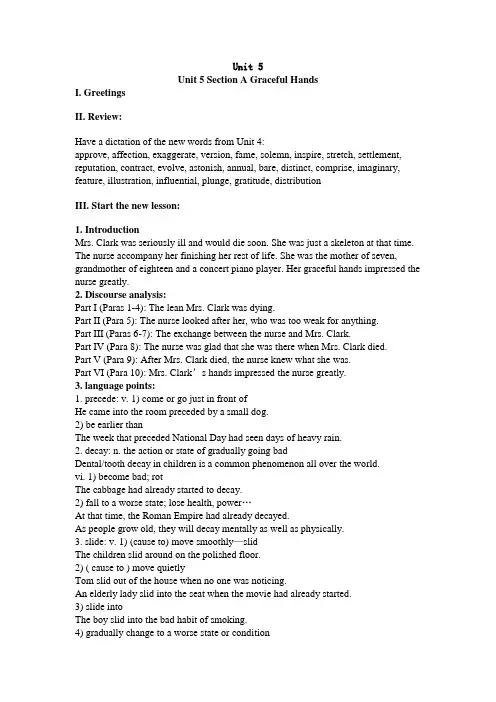
Unit 5Unit 5 Section A Graceful HandsI. GreetingsII. Review:Have a dictation of the new words from Unit 4:approve, affection, exaggerate, version, fame, solemn, inspire, stretch, settlement, reputation, contract, evolve, astonish, annual, bare, distinct, comprise, imaginary, feature, illustration, influential, plunge, gratitude, distributionIII. Start the new lesson:1. IntroductionMrs. Clark was seriously ill and would die soon. She was just a skeleton at that time. The nurse accompany her finishing her rest of life. She was the mother of seven, grandmother of eighteen and a concert piano player. Her graceful hands impressed the nurse greatly.2. Discourse analysis:Part I (Paras 1-4): The lean Mrs. Clark was dying.Part II (Para 5): The nurse looked after her, who was too weak for anything.Part III (Paras 6-7): The exchange between the nurse and Mrs. Clark.Part IV (Para 8): The nurse was glad that she was there when Mrs. Clark died.Part V (Para 9): After Mrs. Clark died, the nurse knew what she was.Part VI (Para 10): Mrs. Clark’s hands impressed the nurse greatly.3. language points:1. precede: v. 1) come or go just in front ofHe came into the room preceded by a small dog.2) be earlier thanThe week that preceded National Day had seen days of heavy rain.2. decay: n. the action or state of gradually going badDental/tooth decay in children is a common phenomenon all over the world.vi. 1) become bad; rotThe cabbage had already started to decay.2) fall to a worse state; lose health, power…At that time, the Roman Empire had already decayed.As people grow old, they will decay mentally as well as physically.3. slide: v. 1) (cause to) move smoothly—slidThe children slid around on the polished floor.2) ( cause to ) move quietlyTom slid out of the house when no one was noticing.An elderly lady slid into the seat when the movie had already started.3) slide intoThe boy slid into the bad habit of smoking.4) gradually change to a worse state or conditionDon’t sell your stocks just because the price starts to slide.The prices of small computers slide fast.n. slide showPresentations with overhead projection or slides may soon look old-fashioned.4. ease: v. 1) relieve; lessenTake this medicine and it will ease the pain./ The aspirin eased his headache.2) make more comfortableI eased her mind by telling her that the children were safe.n. 1) leisure; peace of mindThe retired couple lived a life of ease.2) with ease, the ability to do sth. without difficultyHe writes with ease. / Our team won the game with ease.The wall is so low that they can jump over it with ease.5. outline: n. 1) line(s) showing the shape or outer edge (of sth)She could see the outline of a person through the mist.2) a statement of the main facts or pointsa brief outline of Chinese historyvi. give a short general description of (sth)Let me outline a few of the obstacles that we might encounter in our future work. 6. hint: n. 1) a slight indicationGive me a hint so that I can solve the riddle.2) a subtle way of indicating to sb. what one is thinking or what one wantsThe book is full of hints and tips on low-fat eating and healthy living.v. suggest sth slightly or indirectlyI hinted to him that I was dissatisfied with his work.7. interval: n. 1) a period between two events or times, or the space between two pointsThere was a long interval before he replied.2) a brief period between the parts of performanceI like to eat ice cream in the interval./ Coffee is available during intervals.at intervals (of)He is likely to need to rest at frequent intervals.Trees are planted at intervals of three feet in this area.8. blank: a. 1) empty: I tried to explain, but he just gave me a blank look.Emily turned to him with a blank expression.2) carrying no information or markPlease write your name in the blank space at the top of the page.He turned on the TV but nothing was happening--- a blank screen.n. an empty spaceWhen I tried to remember his name, my mind was a complete blank.When you have completed the blank, send it back to me.IV. Summary:Mrs. Clark was seriously ill and would die soon. She was just a skeleton at that time. The nurse accompany her finishing her rest of life. She was the mother of seven,grandmother of eighteen and a concert piano player. Her graceful hands impressed the nurse greatly.V. Homework Write a composition entitled “Laying-off”.Section B Decisions of the HeartI. GreetingsII. Review:1. Answer the question: Why was the word “graceful”used to describe the grandmother?2. Have a dictation of one paragraph.III. Start the new lesson:1. IntroductionDecisions of the heart actually refer to making patients die without pain. That is to say, in order to alleviate their suffering, the lives of the patients who are seriously ill and hopeless shouldn’t be prolonged by modern medical technology. Doctors shoe the situation of the patient to the families, and they cooperate to decide whether or not the doctor let the patient die without any pain. Under any possible circumstances, the patient should be consulted.2. Discourse analysis:Part I (Paras 1-5): The author gives us a question that what we should do if our90-year-old mother has suffered a stroke.Part II(Paras 6-12): As a doctor, he tells us the measures we should take according to his experience.Part I (Paras 13-17): In this case, the sensible decision is to put the patient’s interest in the first place.3. language points:1. ( all ) on one’s own 1) aloneJohn lives all on his own. / I need some time on my own.2) without helpI managed to repair the car all on my own.She is old enough to do it on her own.Compare: of one’s ownKate has always wanted a car of her own. / You see, we have problems of our own. 2. come along: arrive; appearIs your daughter married yet?No, she’s still waiting for Mr. Right to come along.They had no idea if success would come along one day.3. condemn: vt. criticize strongly, usu. for moral reasonsEast and west leaders join in condemning violence and killing.The author condemned racism in the strongest language in this article.condemn sb to : 1) make sb. take or accept sth. unpleasantHis broken leg condemned him to a wheelchair.2) punish sb with sthIn former times a murderer who was found guilty would be condemned to death.Compare: condemn sb/sth for: have a poor opinion of sb or sth because of sth bad The city was condemned for its high crime rate.4. fight off: keep sth away with an effort; avoid sb. unwantedI must wear warm clothes, as I am fighting off this cold.The firm had to fight off a lot of competitors to win the contract.Compare: fight against: oppose sth or doing sthI tried to fight against sleep, but in vain.We must fight against unfairness and cruelty.5. vain: a. 1) unsuccessful or useless; of no valueNext day I made a vain attempt to look for work, walking from house to house.2) too interested in one’s own appearance or achievementsI think she is a rather vain girl and thinking too much about her figure.Was he as calculating and vain as that?in vain: with no result; uselesslyOur efforts were not in vain and the situation began to improve.Her voice was beginning to rise and she tried in vain to control it.6. withdraw: v. 1) pull or take (sb/sth) back or awayJack withdrew the key from the table. / Mary withdrew 100 pounds from the bank. She was not surprised when he withdrew his objection.2) go away from a place or from other peopleThe smaller company later withdrew from the competition.7. come by: 1) obtain, usu. By effortJobs are hard to come by now with so many people out of work.Did you come by the money honestly?2) receive by accident or chance; getHow did you come by that wound in your arm?8. Chances are (that)…: It is likely that…Chances are that he won’t come back when he gets there.Chances are that She’ll marry the man who is now her boss.9. bring in: ask sb. to come to one’s helpWe may have to bring extra workers in to help us with this big job.A specialist was brought in to set up the new computer system.10. bar: vt. 1) prevent from doing or using sthIf I were in charge, I would bar tourists from getting into the wildlife reserve.He was barred for life from game.2) obstruct so as to prevent progressNo policeman seemed brave enough to bar his way.IV. Summary: We learn a lot of new words and phrases as well as grammars. We also learn many things about reading skills—understanding idiomatic expressions. V. Do the exercisesVI. Homework: Review all the lessons.。
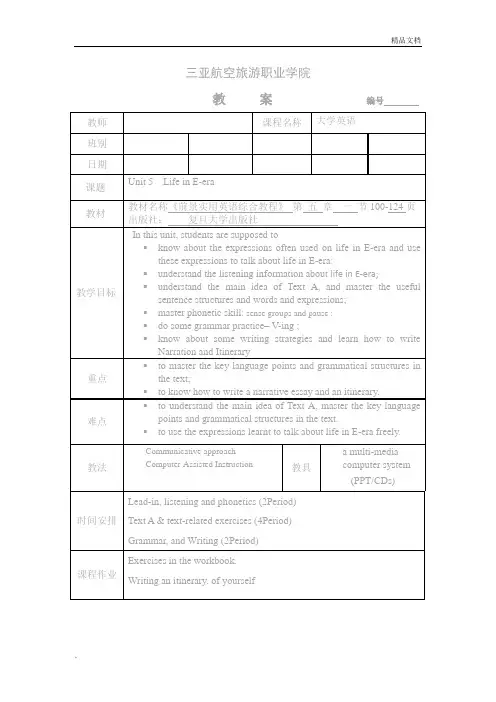
三亚航空旅游职业学院教案编号Unit 5 Life in E-era●Teaching MaterialForward English for Practical Purposes, Book 2, Unit 5●Teaching Aims:In this unit, students are supposed to1.know about the expressions often used on life in E-era and use theseexpressions to talk about life in E-era;2.understand the listening information about life in E-era;3.understand the main idea of Text A, and master the useful sentence structuresand words and expressions;4.master phonetic skil l: V-ing5.do some grammar practice–Narration and Itinerary ;6.know about some writing strategies and learn how to write a narrative essayand an itinerary .●Teaching Emphasis1.to master the key language points and grammatical structures in the text;● 2. to know how to write a narrative essay and an itinerary ..●Teaching Difficulties1.to understand the main idea of Text A, master the key language points andgrammatical structures in the text.2.to use the expressions learnt to talk about life in E-era freely.●Teaching ApproachesCommunicative approach and Computer-Assisted Instruction●Teaching Aidsa projectora multi-media computer system●Teaching Procedures and contents (8 periods)Part A Lead inTask 1 Study the pictures and discuss the questions in small groups.1.What is the red device in the first picture used for?2.How much do you know about the process in the second picture?3.What do you think of smartphones?Task 2 Listen to the short dialogues and fill in the blanks.Task 4 Listen to the recording, and complete the passage.Task 5Discuss the following questions with your partner about your life in E-era1.Do you have the habit of backing up computer files? Why or why not?2.What do you think of backing up data somewhere online rather than onto anexternal hard drive?Text AStoring Your Files Inside the CloudLanguage and Cultural Points in the TextPara. 1Federal grantNote: In the United States, federal grants are economic aid issued by the United States government out of the general federal revenue. A federal grant is an award of financial assistance from a federal agency to a recipient to carry out a public purpose of support or stimulation authorized by a law of the United States.Para. 2back upto make a copy of (a computer file) especially forstorage in another place; to supporte.g. You have to back up your files regularly.你得定期备份文件。
英语必修二第五单元作文范文演讲稿英文回答:Good afternoon, everyone. Today, I would like to talk about the importance of learning a second language. As weall know, English has become a global language and it is essential for communication in many fields such as business, science, and technology. Learning a second language notonly broadens our horizons, but also opens up more opportunities for us in the future.For example, when I was traveling in China, I found it very helpful to be able to speak Mandarin. It allowed me to communicate with the locals and understand their culture better. In addition, I have a friend who got a job at an international company because she was fluent in Spanish. This shows that knowing a second language can give us a competitive edge in the job market.中文回答:大家下午好。
今天我想谈谈学习第二语言的重要性。
众所周知,英语已经成为一种全球语言,在许多领域如商业、科学和技术中进行交流都是必不可少的。
Unit 5 My Future(通用3篇)Unit 5 My Future 篇1unit 5 my futurelesson 39[课前预习•快乐体验]bad news travels quickly.好事不出门,坏事传千里。
一、写出下列单词的第三人称单数形式。
1.do_______2.are_______3.have_______4.ask_______5.study______6.stay_______7.go_______ 8.want______ 9.pla y_______二、试着将下列词组译成英语。
1.今年________2.给某人提建议_______3.篮球运动员_________4.给……写信_________5.一位英语老师_______6.打篮球_____________7.本周_______________8.一个著名的电影明星_______9.将来_____________________10.在报纸上________________三、根据课本p48的内容回答下列问题。
1.who are sending each other e-mail?_________________________________2.who loves playing basketball?_________________________________3.does li ming want to be an english teacher?_________________________________4.what does helen think danny would be when he’s older?_________________________________5.what did li ming do at school this week_________________________________[课堂练习•高效提升]years knows more than books.岁月所知胜于书本。
Forward English(总学时68)Unit 5 Office TechnologiesText A The Paperless Office______ Are We Close to Achieving It?Periods 1 & 2Step 1:Lead-in(15 min)Based on Task 1 to task 2 before Text A. Ss are divided into small groups to discuss the following questions:1.Do you use less paper as you are more dependent on your computer?2.Which do you prefer traditional letters or e-mails?This step is the warming-up activity of Text A.Cues for this step: 1. store information; energy conservation2. letter, mind –to –mind communication; e –mail, quicker,cheaperStep2: Word Study (35 min)I. Ss are required to read all the new words correctly (10 min).II. Explanations of some key words and expressions (25min).1.personal adj. (only before n.) your own; not belonging to orconnected with anyone else.e.g: (1) personal effects / belongs / possessions(2) Of course, this is just a personal opinion.(3) He has run a personal best of just under four minutes.(4) This novel is written from personal experience.personally adv.e.g: (1) Personally, I prefer the second option.(2) All letters will be answered personally.Personalize (BrE: personalise) v.A.(usually passive) to mark sth in some way to show that it belongsto a particular person.e.g: All the towels were personalized with their initials.B.To design or change sth so that it is suitable for the needs of aparticular person.e.g: All our courses are personalized to the needs of the individual. personalized (BrE: personalised) adj.e.g: a highly personalized servicea personalized number plate (= on a car)personality n.A.(c,u) the various aspects of a person’s character that combine to makethem different from other people.e.g: (1) His wife has a strong personality.(2) The children all have very different personalities.B.(u) the qualities of a person’s character that make them interesting andattractive.e.g: We need someone with lots of personality to head the project.C.(c) a famous person, especially one who works in entertainment orsport. SYN: celebritye.g: personalities from the world of musica TV / sports personality2.general adj.A.affecting all or most people, places or thingse.g: The general opinion is that the conference was a success.B.including the most important aspects of sth: not exact or detailed.SYN: overalle.g: They gave a general description of the man.C.highest in rank (only before n.) (also General) (after n.)e.g: the general managerthe Inspector General of PoliceD.(IDM) in general(1)usually; mainlye.g: In general, Japanese cars are very reliable and breakdowns are rare.(2)as a wholee.g: This is a crucial year for your relationships in general and your love life in particular.n. (abbr. Gen.) an officer of very high rank in the army and the US Air Force; the officer with the highest rank in the marinesgenerally adv.A.by or to most peoplee.g: The plan was generally welcomed.B.in most casese.g: I generally get up at six.C.without discussing the details of sthe.g: Let’s talk just about investment generally.Generalize (BrE: generalise) verb generalize (from sth) to use a particular set of facts or ideas in order to form an opinion that is considered valid for a different situation.e.g: It would be foolish to generalize from a single example. generalization n. (c,u) a general statement that is based on only a few facts or examples; the act of making such statements.e.g: (1) a speech full of broad / sweeping generalizations(2) to make generalizations about sth(3) Try to avoid generalizationgenerality n. (pl. -ies) (c, usually pl) a statement that discusses general principles or issues rather than details or particular examplese.g: As usual, he confined his comments to generalities.3. instance n. a particular example or case of sth.e.g: (1) The report highlights a number of instances of injustice.(2) In most instances, there will be no need for further treatment.(3) I would normally suggest taking time off work, but in thisinstance I’m not sure that would do any good.(4) for instance (IDM): for example(5) in the first instance: (formal) as the first part of a series of actionse.g: In the first instance, notify the police and then contact your insurance company.Verb (formal) to give sth as an exampleinstant adj.A.(usually before n.) happening immediately . SYN: immediatee.g: (1) She took an instant dislike to me.(2) The show was an instant success.B.(only before n.) ( of food ) that can be made quickly and easily,usually by adding hot water.e.g: instant coffeen. (usually sing)A. a very short period of time. SYN: momente.g: (1) I’ll be back in an instant.(2) Just for an instant I thought he was going to refuse.B. a particular point in time.e.g: (1) At that (very) instant, the door opened.(2) I recognized her the instant (that) (= as soon as) I saw her.(3) Come here this instant (= immediately).instantly adv. immediatelye.g: (1) Her voice is instantly recognizable.(2) The driver was killed instantly.instantaneous adj. happening immediately.e.g: (1) Death was almost instantaneous.(2) an instantaneous responseAdv. instantaneously4. rental n.A. (also rent especially in NAE) (U,C,usually sing) the amount of money that you pay to use sth for a particular period of time.e.g: (1) Telephone charges include line rental.B. the act of renting sth or an arrangement to rent sth.e.g: (1) the world’s largest car rental company(2) video rental(3) (especially NAE) a rental carC. (c) (especially NAE) a house, car or piece of equipment that you can rent.e.g: ___ Is this your own car?___ No, it’s a rental.rent n.A.( u, c ) an amount of money that you regularly pay so that you can usea house, etc.e.g: (1) How much rent do you pay for this place?( 2 ) The landlord has put the rent up again.B.( u, c ) (especially NAE) = rentalC.(c) (formal) a torn place in a piece of material or clothingIDM: for rent (especially NAE) (especially on printed signs)e.g: available to rentverb.A. rent sth (from sb) : to regularly pay money to sb so that you can use sth that they own, such as a house, some land, a machine, etc.e.g: (1) Who do you rent the land from?(2) to live in rental accommodation / housing / propertyB. rent sth (out) (to sb) : to allow sb to use sth that you own such as a house or some land in exchange for regular payments.e.g: (1) He rents rooms in his house to students.(2) The apartment rents for $500 a month.renter n.A.a person who rents sthB.(NAE) a person or an organization that provides sth for people to rent rentier n. (technical) a person who lives from money earned from property and investments5. information (also informal info) n. (u) (information on / about sb / sth) facts or details about sb / sth.e.g: a piece of informationa source of informationIDM: for information onlyinformational adj. (only before n.)e.g: the informational content of a bookinformative adj. giving useful informatione.g: The talk was both informative and entertaining.Opp: uninformativeinformed adj.having or showing a lot of knowledge about a particular subject or situation.e.g: (1) an informed critic(2) an informed choice / decision / guess / opinion(3) Keep me informed of any developments.Opp: uninformedinform verbrm sb (of /about sth): to tell sb about sth, especially in anofficial waye.g: Please inform us of any changes of address.rm oneself(of / about sth): to find out information about sth e.g: We need time to inform ourselves thoroughly of the problem.C.(formal) to have an influence on sthe.g: Religion informs every aspect of their lives.rm on sb: to give information to the police or sb. in authorityabout the illegal activities of sb.e.g: He informed on his own brother.Step 3: Finish the exercises from task 2 to task 5(25 min)Step 4: Assignments (5 min)Periods 3 &4Step 1: Text learning (30 min)1.Read the text together and finish task 1 on page 99. (10 min)2.Explain some main points and difficult points. (20 min)Step 2: Workplace Skills (20min)Preview the text.2. Finish task 1 and task 2 on page 110 and page 111 .(10 min)Step3: Writing (25mins)1.Read the guidelines for writing shipping advice . (10 min)2.Do the exercise on page 113. (15min)Step 4: Assignments (5 min)Review the text.参考资料:1. Forward English (Teacher’s Book I II)2. Forward English Viewing, Listening & Speaking ( Teacher’s Book I II)3. College English (Using English Grammar)1. Know the importance of taking the initiative. (10 min).Unit 5 MarketingPeriods 5&6I. Warming – up (10 min)Work in pairs and discuss the following questions:1)In your opinion, what kinds of “needs”should be satisfied when peopleconsume?2)Have you seen any interesting advertisement before? Please describe some. II. Lead-in(15 min)1.Watch the video clip and tick the marketing ideas that Freddie and Donsuggest. (5 min)2.Some language points. (5 min)3.Watch and enjoy. (5 min)III. Part A Dialogue 1(15 min)1.Listen to the dialogue once and make a right decision.(5 min)2.Listen to the dialogue twice and fill in the blanks.(5 min)3.Listen and repeat the dialogue .(5 min)IV. Part A Dialogue 2 (15min)1. Listen to the dialogue once and make a right choice.(5 min)2. Listen to the dialogue twice and fill in the blanks.(5 min)3. Listen and repeat the dialogue .(5 min)V. Passage (20min)1. Learn some new words in the passage (5min)2. Listen and fill in the blanks. (5min)3. Listen and answer the question on page 65. (10 min)V. Assignments(5 min)Make a short speech about the advantages of e –marketing over traditional marketing.Periods 7&8I. Warming up (10 min)Work in groups. Talk with your classmates about whether you will go to a store you’ve never been to because it’s more expensive.II. Part B(25 min)1.Watch the video clip and make a right decision on page 67.(10 min)2.Explanations of the difficult points (15 min)III. Part C Quiz(25 min)IV. Discuss the keys to the quiz (15 min)V. Assignments (5 min)1. Use what you learned in unit 5 to have a practice with your partner.2. Prepare for the final exam。